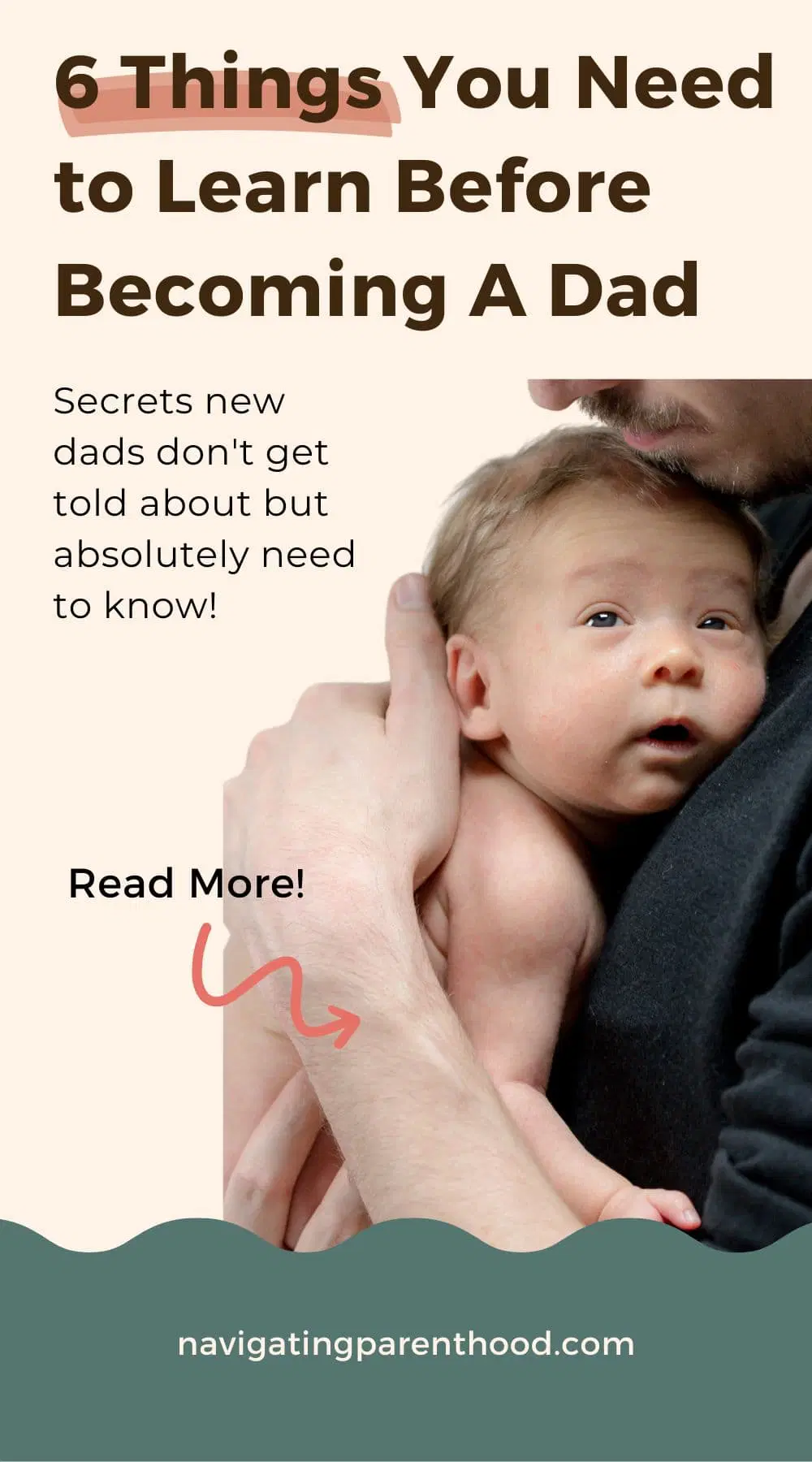6 Things You Need to Know Before Becoming a Dad
Taking the step to become a dad is tremendous — it means you not only love someone enough to be totally connected with them for the rest of your lives but that you’re ready to care for a little being together. It’s said that when you have a child it’s like sharing your heart with the world, having it exist outside yourself, and tending to this vulnerable part of you with someone you hold close — and it’s totally true. But before you leap into the world of parenting with fantasies about what it’s going to be like and thinking all you need is the baby gear on some list, there are a few other things you need to know so you can be better prepared for this amazing step in your life. Save this page, share this post, read it over then read it again. These insider tips about what moms wish dads knew are learned after becoming a parent and not typically written about, but you’re getting the info beforehand — use it wisely, young Padawan.

1. How You Share Responsibility Affects Your Sex Life
More couples struggle with this one after becoming parents than you know. The dad wonders why his wife is being “frigid” and the mom simply feels touched out and helpless. Once you become a parent everything shifts — including your sex life. Not only does it take time to heal from having a baby, but if you push sex too soon, don’t help enough with things like diaper changes and feedings, or don’t offer emotional support it all will affect your sex life. It doesn’t matter if you’re the moneymaker or you both work — if you don’t give the other parent a break by taking over with the kids and doing some household chores (or simply not leaving your dishes out in the first place) then don’t expect sex.
It’s extremely difficult to navigate a sense of self after having a baby (even years later), so figuring out when mommy ends and sex kitten starts isn’t easy. Without some time to themselves, your partner can’t get out of mommy mode — which means she’s thinking about sore nipples, the next feeding, the poop on her shirt, and someday getting some sleep . . . not sex. How you interact with your kids also plays a part: If you’re a caring dad it will make the relationship with your spouse a lot stronger. There are some great book recommendations on our Amazon Storefront Book List that can help prepare your relationship for this shift before baby arrives and I also offer more information in my virtual postpartum planning consultations.
2. Vacations Will Never Be The Same
When you become a new parent there isn’t normally enough money or time for a vacation. That or the destinations you’d like to go to aren’t appropriate for your baby until she gets a lot older. Though kids under 3 are free at Disneyland, it isn’t always fun taking turns on the rides and going them alone. Vacations get a bit more expensive, include a lot more people (extended family is a must if you want alone time), and simply aren’t the same for years to come because spending an extra $2,000 for your toddler’s plane ticket so the family can go to Hawaii where you basically just end up going to the zoo doesn’t seem feasible when you have a local zoo a few miles away. You’ll also need to consider your baby’s care needs and development — newborns need to be held close those first 40 days and a lot of tummy time for development with limited time in a “container.” Your partner will also need ample time to rest and heal since the first 40 days after birth is said to set the stage for their health for the next 40 years.
3. The Parenting World Is Far From Equal
Ashton Kutcher became aware that parenting is unequal when realizing that men’s restrooms at places like Costco and Target don’t have changing tables. (Though not all women’s bathrooms have them either. Some places have a Family Restroom, while others have nothing and you just have to use the stroller or a booth.) Women are still thought of as the caretakers, while men are the money-makers.
But that isn’t true anymore! There are plenty of great stay-at-home dads, as well as families where both parents work (and hopefully each parent is taking turns with kiddo duty). One major indicator of the bias? When a dad does something ordinary that any mom might do several times a day with their kiddo and it’s seen as amazing. Example: I once gave my husband a Little Mermaid backpack to wear while waiting in line at Disneyland and within seconds people took notice and fawned over him for being an above-and-beyond dad. I wore that thing and carried our daughter all day without a word from anyone, but he’s amazing for wearing it all of 10 minutes.
It’s honestly a bit sad. It shows just how distant fathers used to be decades and decades ago, and how we still think they are. When a father is loving and a supportive co-parent, hearts start to flutter like they’re watching a fairytale. Men Do Babywear: 6 Dads Share Their Journey is my all-time top article on Navigating Parenthood because of these biases. Women want to show their partners that they can try babywearing because other men have, and also like to see dads making an impact in their children’s lives. This is something you really need to be aware of before you become a dad so that you understand that there will be more hurdles for you as you try to be a supportive parent —be one anyway!— but also because you shouldn’t let this shower of praise get to your head. Everyone needs encouragement and that includes your partner.
4. Becoming a Parent Instantly Ages You
OK so not all parents instantly get a bit wiser and feel older, there are still the select few who go out clubbing a week after giving birth and leave the baby with the grandparents. Yea . . . but I’d like to think that the majority of parents are sticking with their newborn or toddler most of the time, which means no matter how much you’d like to stay up for that 10 p.m. program it’s likely you’ll already be passed out when it airs. Kids are tiring. There’s nothing like being a parent, but man it is tiring.
For myself (and several parents I’ve spoken to) there was also a change in life perspective after becoming a parent. I stopped drinking soda and binge eating processed candy (I have weak moments, and I’m not sugar-free or anything, but I try) then became aware of things like GMOs and radiation from digital devices. How I viewed my relationships with people and responded to situations changed, too. The changes in your life after becoming a parent really vary by the person and this isn’t a negative thing at all — it’s a necessity and shows you’re growing to be the person your child needs to shape who they become in life.
5. Favorites Come And Go In Phases
It’s fantastic to be excited about becoming a parent and having a little one to show the world to and bond over whatever with, but be aware that there are two parents. Add your partner to your fantasy about your soon-to-be BFF because both boys and girls go through phases where they are all about mommy or all about daddy for an extended period of time (it could be a month or years) then all of a sudden change their mind. Remember that your time will come and that when your child changes their favorite it’s going to be super sad for the parent who used to feel like they were the closest to the child.
Avoid any competition with your partner about who is the favorite by agreeing to include one another no matter who the child says is their favorite at that time. Be aware that this changes, and that as your child gets into the toddler years he’ll test boundaries by asking one parent something and then asking the other the same question if he knows they’ll give the answer he wants (this is a learning age for the teen years). Make sure you have a united front and don’t compete with your partner. Your kiddo loves you both.
6. Prepare For The Unexpected
Though just six tips don’t really cover everything (I’ll need to add Parts 2-30 later), the last part of this list is pretty important. As you journey into parenthood, understand that nothing ever goes as planned and you should expect the unexpected. Sometimes moms experience severe depression after giving birth and it could take years before she feels like herself again. Giving birth can affect a mom’s sex drive, emotions — everything — but it changes a lot for dads, too. Birth plans are so great to have, but they usually get thrown out the window when it’s finally time to give birth because of one thing or another that happens. Roll with it, be supportive of one another, and know that even if you both wanted a natural birth it’s OK if it isn’t as long as you deliver the baby safely and get to hold her in your arms.
There’s no being prepared for the unthinkable — a miscarriage, stillbirth, or death of mom while giving birth — but these are also realities that arise once you’ve decided to take the leap into parenthood, so the one thing you can be prepared for in this journey of the unexpected is to be an emotional support for your partner, and them for you. Talk about possible outcomes and situations that may arise with getting pregnant and becoming parents. It’s a tough discussion, and the unknown is pretty scary, but you’ll be glad it was addressed ahead of time if something ever comes up. And understand that everything you talked about before having the baby may change once you bring the baby home! Check-in with each other again, and make a weekly meeting of it.
What would you add to this list? Share in the comments below!
This post was originally published here on 4/28/15.



This is such an amazing article! Number one is definitely my favorite haha.
Thank you! Yesss #1 is huge and you don’t really expect it.